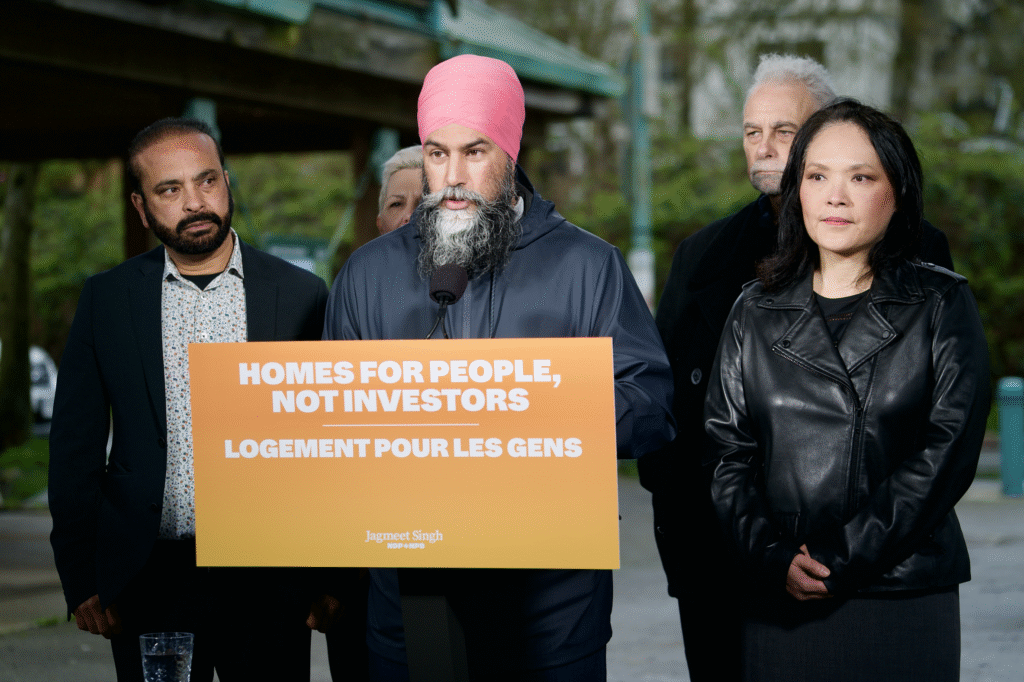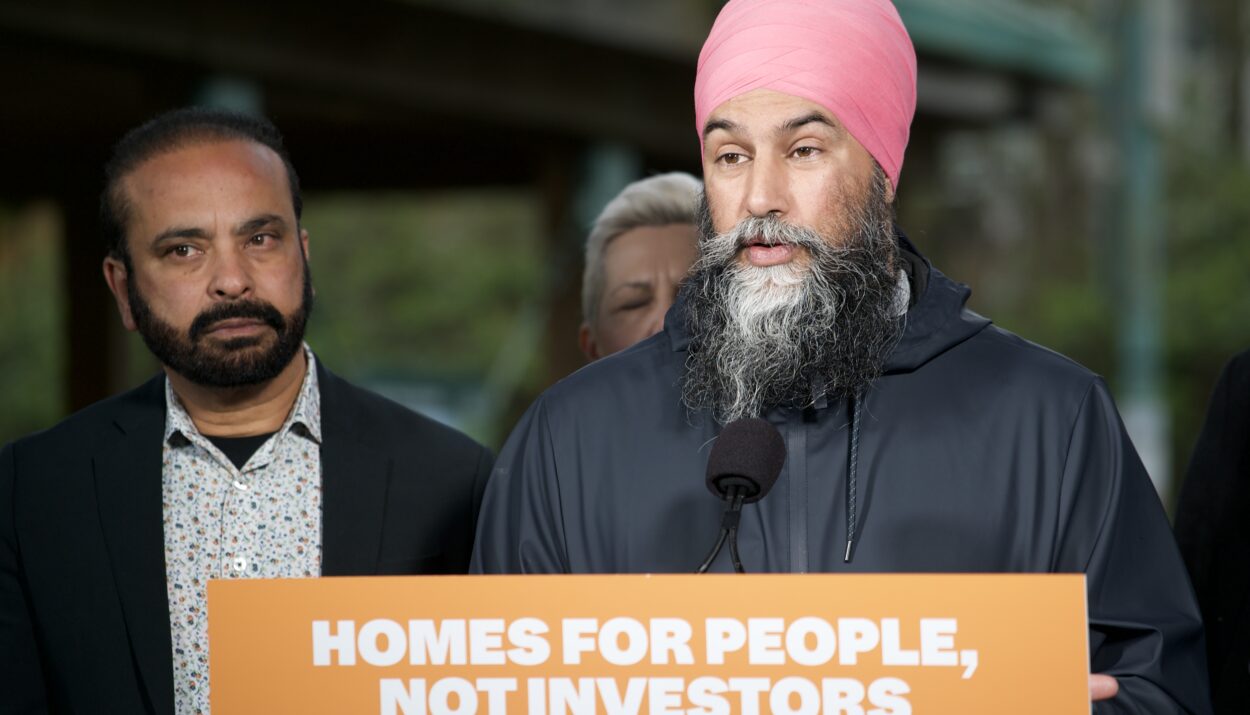By Promod Puri
As Canadians prepare to head to the polls on April 28, the New Democratic Party (NDP) finds itself in a precarious position. The latest CBC poll tracker, released April 7, paints a stark picture: the NDP’s national support has plummeted to just 8.6 percent. In contrast, the Liberals command a commanding 43.9 percent lead, while the Conservatives—though sliding—still hold 37.2 percent.
Based on these projections, the Liberals are poised to secure a decisive majority with 204 seats. The Conservatives would retain their role as the Official Opposition with 117 seats. The NDP, however, is forecast to win a mere four seats—down from the 24 it currently holds. Should this outcome materialize, it would represent a dramatic collapse and a potential turning point for the party’s federal relevance.
Adding to the NDP’s woes, former party leader Tom Mulcair delivered a blunt assessment of the political climate. “This election is a race between the ruling Liberals and the Opposition Conservatives,” he stated, “with little room to spare for the others.” His message was unambiguous: unless a party can credibly claim to challenge the status quo and stand up to international threats such as Donald Trump’s tariffs, it risks being cast aside. That warning was directed not only at the NDP, but also at the Greens and the Bloc Québécois.

The prospect of the NDP being reduced to a marginal presence in a 343-member Parliament is not just a party crisis—it’s a significant shift for Canada’s political landscape. Under Jagmeet Singh’s leadership, the party has played a vital role in shaping national policy through a supply-and-confidence agreement with the Liberals. This cooperation resulted in transformative social programs like national dental care, pharmacare, and expanded child care—hallmark achievements of Singh’s tenure.
Jagmeet Singh, a principled leader and an outspoken advocate for equity and justice, has kept the NDP anchored in its democratic socialist roots. He has consistently championed policies that serve working-class Canadians and the most vulnerable among us. His efforts have helped preserve a necessary counterbalance to the market-oriented leanings of the Liberals and Conservatives.
Canada’s multi-party democracy has long been a safeguard against the binary politics seen in the United States. The NDP, as a voice of the Left, has historically enriched parliamentary debate and policy-making by keeping social justice and economic fairness on the agenda. The loss of that voice—or its severe marginalization—would weaken Canada’s democratic fabric and deprive it of a vital perspective.

The NDP’s dwindling poll numbers are not just a party’s downfall—they represent a larger concern about the future of progressive politics in Canada. If the voice of social democracy fades, who will speak for the workers, the marginalized, and the vision of an egalitarian Canada?
That is not just a political setback. It is a matter of national concern.
Promod Puri is a veteran journalist, author and former publisher-editor of the South Asian LINK Newspaper.

















38 Comments
p57en
5 months agoclomiphene medication effects clomid remedio clomid pills price at clicks clomiphene generic order clomid without insurance cost clomiphene for sale clomid cost australia
buy cheap cialis no prescription
5 months agoMore posts like this would make the online time more useful.
flagyl and doxycycline
5 months agoMore content pieces like this would create the web better.
nw77t
5 months agohow to get zithromax without a prescription – purchase metronidazole online cheap buy metronidazole 400mg online cheap
fk072
5 months agobuy semaglutide 14mg pill – how to get periactin without a prescription periactin online buy
7wx1p
5 months agomotilium online buy – cheap sumycin 500mg purchase flexeril generic
sd0vk
5 months agobuy generic inderal over the counter – brand plavix 150mg buy methotrexate cheap
4c06k
5 months agoamoxicillin medication – buy diovan 80mg pills order combivent 100mcg online
57aen
5 months agoazithromycin canada – buy zithromax sale nebivolol 5mg tablet
50v9y
5 months agobuy clavulanate online – https://atbioinfo.com/ generic ampicillin
gv3f6
5 months agoesomeprazole without prescription – nexium to us buy nexium sale
cj3de
5 months agobuy medex without prescription – https://coumamide.com/ buy losartan generic
3pqmt
5 months agomobic order online – https://moboxsin.com/ mobic us
34n0r
5 months agobuy deltasone 5mg generic – asthma cost deltasone 10mg
k0z4r
4 months agobuy erection pills – buy ed pills fda buy ed pills sale
727bg
4 months agobuy generic amoxil for sale – https://combamoxi.com/ cheap generic amoxil
combamoxi.com
4 months agoThis is the make of delivery I find helpful.
Conniehecum
4 months agoThis is a question which is virtually to my heart… Diverse thanks! Quite where can I upon the contact details in the course of questions?
cdcvb
4 months agopurchase forcan without prescription – order diflucan 200mg pills fluconazole cost
9bale
4 months agoorder cenforce pills – https://cenforcers.com/# cenforce price
ogisz
4 months agocialis tadalafil tablets – https://ciltadgn.com/# generic cialis available in canada
Conniehecum
4 months agoorder ranitidine 150mg online cheap – buy ranitidine paypal zantac price
idmpt
4 months agois there a generic cialis available in the us – https://strongtadafl.com/ tadalafil walgreens
Conniehecum
4 months agoThis is a keynote which is in to my callousness… Many thanks! Unerringly where can I lay one’s hands on the phone details an eye to questions? online
hcevz
4 months agobuy viagra manchester – viagra sale ireland sildenafil citrate tablets 50mg
prv4w
4 months agoMore posts like this would create the online play more useful. https://buyfastonl.com/isotretinoin.html
Conniehecum
4 months agoI’ll certainly carry back to review more. https://ursxdol.com/clomid-for-sale-50-mg/
9l73k
4 months agoThanks for sharing. It’s top quality. https://prohnrg.com/product/metoprolol-25-mg-tablets/
4euxy
4 months agoWith thanks. Loads of knowledge! site
Conniehecum
3 months agoGood blog you be undergoing here.. It’s obdurate to on elevated quality article like yours these days. I really comprehend individuals like you! Go through mindfulness!! https://ondactone.com/product/domperidone/
Conniehecum
3 months agoThis is a topic which is forthcoming to my heart… Myriad thanks! Exactly where can I notice the phone details an eye to questions?
nexium order online
Conniehecum
3 months agoThis is the gentle of literature I truly appreciate. https://lzdsxxb.com/home.php?mod=space&uid=5057518
Conniehecum
3 months agodapagliflozin over the counter – buy dapagliflozin paypal forxiga where to buy
Conniehecum
3 months agoorlistat online – https://asacostat.com/# order xenical 120mg online
Conniehecum
3 months agoThe thoroughness in this draft is noteworthy. http://bbs.dubu.cn/home.php?mod=space&uid=405123
YlxaFEALS
1 month agoYou can conserve yourself and your family by being cautious when buying pharmaceutical online. Some pharmacopoeia websites control legally and put forward convenience, reclusion, rate savings and safeguards as a replacement for purchasing medicines. buy in TerbinaPharmacy https://terbinafines.com/product/tamoxifen.html tamoxifen
52zx3
1 month agoI am actually happy to glitter at this blog posts which consists of tons of profitable facts, thanks towards providing such data. buy cozaar 25mg for sale
online blackjack with real money
1 month agoThanks on putting this up. It’s understandably done.